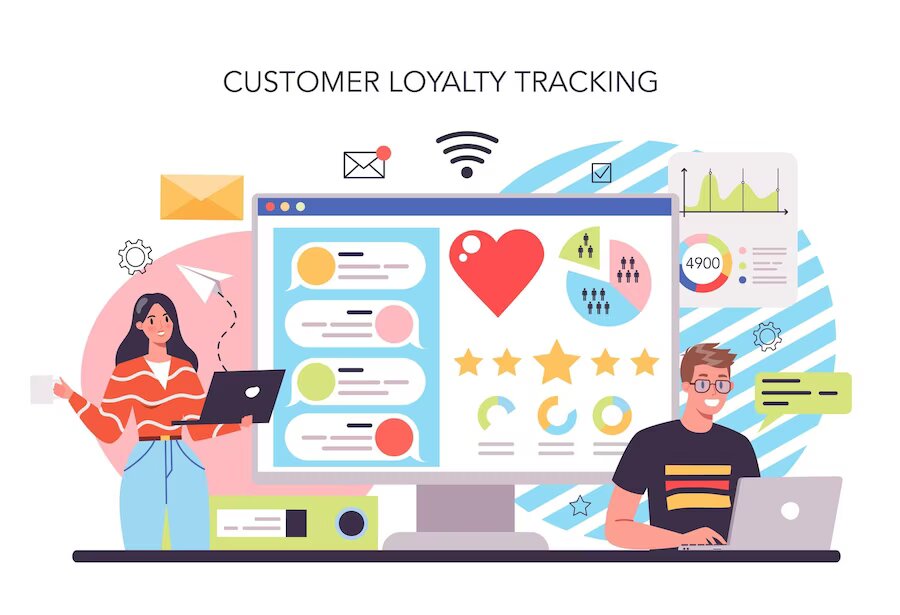Custom Loyalty Software Or Third-Party Platform: What To Choose For Omnichannel Retail
5 Mins Read
Published on: 16 May 2023
Last Updated on: 14 October 2024

toc impalement
Loyalty programs are effective for client retention, increased sales, and higher customer lifetime value. Such activities incentivize buyers to continue shopping with a brand by offering rewards and exclusive benefits for their continued loyalty.
According to the 2021 Loyalty Industry Benchmark Report, omnichannel retailers with reward programs saw a 25% increase in revenue compared to those without loyalty. On the other hand, a survey by Salesforce found that 58% of consumers have switched brands because another company offered a better customer experience.
This convinces us that loyalty programs can significantly impact a business’s bottom line, making them an essential tool for enterprise omnichannel retailers.
What Tools Does Omnichannel Retail Use To Handle Loyalty Programs?
Setting the enterprise merchant loyalty solution for omnichannel business can be a true challenge in the case of integrating loyalty programs across multiple channels and touchpoints. Quite often, to orchestrate the entire loyalty program, it is necessary to configure and align the data from a number of separate tools:
- CRM systems
- Loyalty program management software
- Mobile apps
- Point-of-sale (POS) systems
- Data analytics tools.
It plays a critical role in enabling omnichannel retailers to design and manage effective loyalty programs that offer a seamless and personalized experience for customers across multiple touchpoints.
To overcome the need to synchronize different tools, businesses are striving to create a unified multi-functional ecosystem that solves most tasks, including omnichannel marketing.
There are several solutions that can be included in such a unified multi-functional ecosystem:
- ERP (Enterprise Resource Planning) provides a centralized database that can be accessed by different departments and functions within an organization, allowing for greater visibility and control over business operations. This can include managing finances, accounting, inventory, marketing, and human resources.
- Customer Data Platforms (CDP) collect and unify customer data from various sources, providing a single view of the customer. This can help businesses to personalize their marketing efforts and create a seamless omnichannel experience.
- Marketing Automation Software automates marketing processes and allows businesses to create and manage campaigns across different channels, including websites, mobile apps, email, and social media.
By integrating these and other tools into a unified multi-functional ecosystem, businesses can streamline their operations, improve customer experiences, and drive growth.
But the significant question remains – whether to build such a system from scratch or to seek the services of third-party providers like Loyalno. Let’s examine the arguments for and against each option.
Private Loyalty Software Or Third-Party Cloud Platform: Pros And Cons Of Custom Development
Custom development of enterprise loyalty software can be a good option for businesses that require specific features or functionality. However, it requires significant investment and resources, and the company must be prepared to take on the responsibility of maintenance and support.
Advantages Of Developing Loyalty Software From Scratch
- Customization to meet the specific needs of the business and its customers. This can result in a more personalized experience and greater customer satisfaction.
- Enhancement of existing environment. Retailers can embed the software into their existing business and marketing environment seamlessly, tailor the features and functionalities to meet their specific needs and integrate it into their existing IT systems.
- Control. Building a private loyalty solution gives businesses complete control over the software’s features, functionality, and data. This allows for better flexibility in terms of integrations, security, and compliance.
- Cost-effectiveness. In the long run, building loyalty software from scratch can be more cost-effective than relying on a third-party platform. Retailers will not have to pay recurring fees to use the software and can save money on customization and integration.
Disadvantages Of Developing From Scratch
- Upfront costs. Such a decision can require significant upfront costs, including hiring developers, purchasing hardware, and investing in infrastructure. This can be a barrier for businesses with limited resources.
- Time-consuming. This can take weeks or even months to complete. So you can delay the launch of the loyalty program and put businesses at a disadvantage compared to competitors.
- Maintenance and support. After the software is built, businesses will be responsible for maintaining and supporting it. This can mean additional resources and expertise, especially if the software requires updates or fixes.
Custom Loyalty Software Vs. Third-Party Platform: Pros And Cons Of Ready-Made Solution
Using a third-party cloud platform for omnichannel retail loyalty can be a good option for businesses that want a quick and cost-effective solution.
However, it may have limitations in terms of customization and data security, and businesses must be prepared to rely on third-party providers for the availability and performance of the software.
Advantages Of Cloud Platforms
- Quick deployment. Third-party cloud platforms can be deployed quickly, allowing businesses to launch their loyalty program faster and gain a competitive advantage.
- Market-proven solution. Cloud platforms usually offer market-proven solutions that have been tested and refined by industry experts. These providers typically have a track record of success and a large user base, which means that businesses can benefit from the collective expertise of these users. So it can help you stay competitive in the market while minimizing risk and maximizing ROI.
- Cost-effective. Providers typically have lower upfront costs and can be more accessible for middle businesses.
- Scalability. Cloud platforms can easily scale to accommodate growing businesses or changes in customer demand, without requiring significant investment in infrastructure or resources.
Disadvantages Of Ready-Made Loyalty Software
- Limited Customization.
- Data security and privacy. Merchants must trust third-party providers with their data, which can be a concern for companies, especially in industries with strict compliance requirements.
- Reliance on third-party providers. You are reliant on other businesses for the availability, performance, and security of the loyalty software. This can be a risk if the provider experiences downtime, data breaches, or other issues.
Conclusion
We have discussed the importance of loyalty programs in enterprise omnichannel retail and how businesses can effectively manage these programs through the use of IT systems such as ERP, CDP, and complex enterprise loyalty software.
We have found the challenges of omnichannel loyalty programs and the benefits of using a single, integrated system, and considered the pros and cons of building a private loyalty software versus using a third-party cloud platform.
Ultimately, the decision between these options depends on the specific needs and resources of the business. By carefully considering all these factors, businesses can create effective loyalty programs that enhance customer engagement and drive sales.
Additional:


















Comments Are Closed For This Article